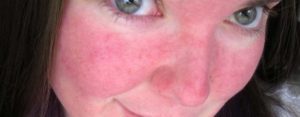 Rosacea
Rosacea
Rosacea is a skin condition wherein there is chronic inflammation of the parts of the face, such as the cheeks, forehead, and nose area, manifesting either as red patches, red lines, or tiny red pustules which can be similar to acne. The inflammation is chronic and is manifested as flare ups with periods of resolution in between. A flare up can last between weeks to months.
Causes and Risk Factors
The cause of rosacea is currently unknown; however, it is believed that genetics or environment may play a role in its progression. It occurs more commonly in fair-skinned people, such as Caucasians, in people who are prone to blushing, and in middle-aged women. People with a family history of rosacea also have a higher risk of developing the condition. Several factors may play a role in triggering rosacea. These triggers work by increasing the blood flow to the face, and include the following:
• Feeling stressed, embarrassed, or angry.
• Eating spicy or hot foods.
• Exposure to the sun.
• Exercise.
• Alcohol consumption.
Symptoms
The symptoms of rosacea tend to involve only the face. Flares or attacks of rosacea are interspersed in between by periods of clear skin. Before the condition develops, symptoms such as blushing or flushing may occur, called pre-rosacea. The following are the characteristic symptoms associated with rosacea:
• Red patches on the face.
• Facial flushing.
• Visible blood vessels on the areas of the face (telangiectasia).
• Nose may become red and bulb like in shape.
• Tiny red bumps or pustules which can be similar to acne.
• Red, inflamed eyes which can be painful.
Diagnosis
The diagnosis of rosacea largely relies on examination of the skin, and the patient’s medical history, so no specific tests are usually needed.
Treatment
Rosacea cannot be treated permanently. The goal of treatment is to prevent flare ups by avoiding the trigger factors and to reduce the intensity of the flare ups.
Management includes lifestyle changes to avoid trigger factors such as sun exposure, stress, spicy foods and alcohol. Using mild facial cleansers, moisturizers, and sunscreens are also recommended in order to prevent irritation of the skin. There are also many treatment options available which can be used to provide relief during flare ups. These include:
• Oral or topical antibiotics such as metronidazole, tetracycline, minocycline, and doxycycline help in controlling the eruptions of rosacea.
• Topical ointments such as tretinoin and azelaic acid are recommended.
• Photodynamic therapy and Laser treatments may be used to treat the red patches and prominent blood vessels on the face.